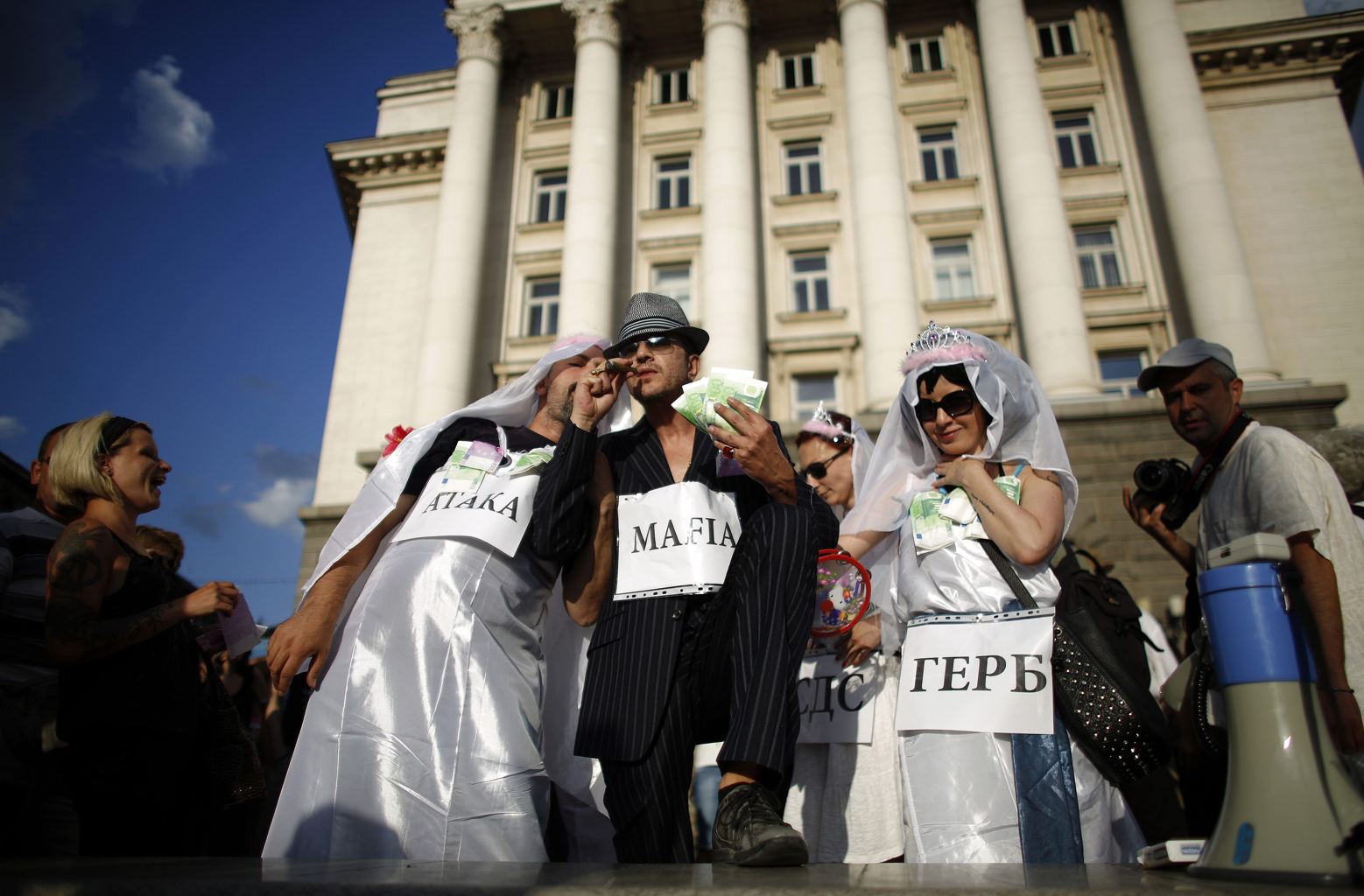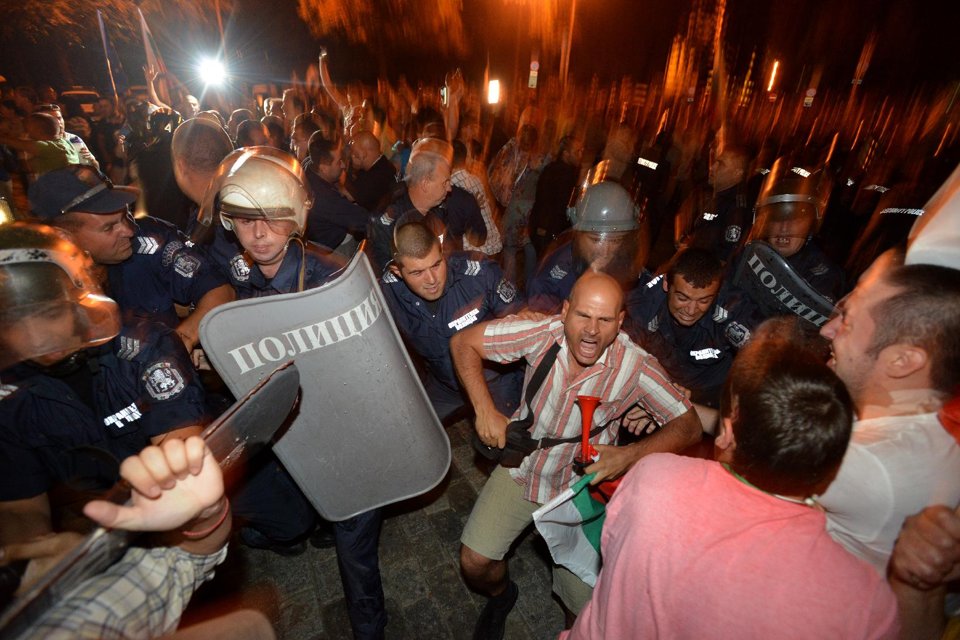
The Bulgarian parliament has gone on summer recess without responding to nearly two months of daily protests in Sofia, leaving activists to reconsider their strategies in search for, as Boris Kolev puts it, “a way to end the blatant government corruption that has plagued the country since the fall of communism.”
Kolev, like many demonstrators in Bulgaria’s capital city, is young, holds a university degree and has been organizing the anti-government movement through social media.
“But this isn’t enough,” he said. “The government has completely ignored our demands and they think these demonstrations will end by the time they get back in September. What they don’t know is that while they sit on the beach, we are getting stronger, more organized and we’re planning larger actions for the fall.”
While fewer protesters are taking the streets during summer recess, much of the movement has moved online, finding a home on independent web sites that spur public debate. In the beginning of July, Kolev launched Citizen.bg, an online forum where people share ideas, discuss new laws to limit corruption and then vote on them in an effort to create a popular vision for Bulgaria’s government.
“We are basically crowdsourcing our future political system,” Kolev said.
In its first three weeks, Citizen.bg drew more than 20,000 unique daily visitors and became the pulse of Bulgaria’s reformist ideology. One day after launching the site, Kolev said state officials visited his office, tracing the signal to his personal computer, and threatened to fine him with tax evasion.
As the site gained popularity, members of the Bulgarian Socialist Party (BSP) dismissed Citizen.bg as an attack from political opponents that are secretly funding the forum, but Kolev denies any affiliation with political parties.
“This is a war of communication and it is very much a one-sided war since the government and their close friends own all our major media outlets while the opposition is limited to Facebook, Twitter and online forums,” Kolev said, adding a popular morning TV program was recently taken off the air after it invited guests to debate over the anti-corruption movement.
“They want complete power and this cannot go on,” he added. “One group of cronies cannot own the whole country.”
Building a Sustainable Political System
Demonstrations began on June 14, immediately after Delyan Peevski, a national media mogul with controversial business connections and practices, was appointed head of the Bulgarian state security agency.
Since then, tens of thousands of protesters have filled the streets of Sofia on a daily basis, demanding that Prime Minister Plamen Oreshrski step down along with his left-wing coalition cabinet divided between the BSP and the Movement for Rights and Freedoms party (DPS).
While many demonstrators are calling for immediate elections, Svetoslav Nikolov, a representative of the Citizen’s Committee, said that going to polls now would only produce similar results.
“We had elections in February following protests over high energy prices and now look where we are: back in the streets,” he said. “If we want real change we must first revise our election code and then hold elections. This is the root of the problem.”
Working in an encampment across the street from Bulgaria’s National Assembly building, Nikolov types on his laptop as he explains the main goals of Citizen’s Committee, a leading organization in the movement.
First, the group calls for new voting laws that would allow citizens to elect individual politicians, replacing the current system where political parties are elected and then positions are filled through obscure coalitions.
Second, Nikolov said the country is in desperate need of a new voting registration system that would expel deceased citizens from the eligible voter pool. On more than one occasion, Nikolov said, their names have been used to cast ballots.
Other demands listed on a red banner above Citizen’s Committee encampment include term limits, campaign finance reform, free access to state-run media outlets and, scrawled in thick black marker, the due date to meet these goals reads: “Yesterday.”
The previous election produced a voter turnout of 20-22 percent of the eligible voters. Nikolov credits low participation to an outdated electoral system, saying many Bulgarians have lost faith in political solutions because they don’t have real choices. By rewriting the constitution, Nikolov believes citizens can change the direction of their political system and “finally put some new faces in office.”
“I’m a foreign trade analyst,” Nikolov said. “All I do is look for cycles and Bulgarian society has a cycle of 20 to 23 years. We got a communist constitution in 1948. Then another one in 1971. After that, we became a democracy and got a new constitution in 1991.
"Now we’re in 2013 and it’s time to a change to our legal system once again because the one we have simply does not work. I just hope we can break the cycle this time and establish a constitution that will give us stability for 30, 40, maybe 50 years into the future.”
‘A Message That Will Reach Their Ears’
Aside from a brief episode where rock-throwing protesters entrapped politicians in their offices through the night of July 23, demonstrations in Sofia have remained peaceful.
Pavel Stefanov, an IT support technician in Sofia, said he never took part in political movements before 2013 and while he is relieved that crowds have kept calm, he says the strategy is not working.
“Unfortunately, our peaceful protests haven’t pushed the government to act and I fear the movement will become violent and more radicalized if this continues,” he said.
Stefanov proposed mass financial divestment as another peaceful tactic that can put more weight behind the movement’s demands.
“I took my money out of the First Investment Bank, which is owned by people close to our corrupt politicians,” he said. “Of course, my small sum of money won’t take down their business, but if everyone does it we can have an impact and send a message that will reach their ears.”
From buying votes in rural areas to backroom relationships with Russian energy firms, Zhenya Stefanova, an IT consultant in Sofia, said the BSP must be stopped before inflicting irreversible damage on the nation’s economy.
“When politicians make a business plan in this country they must expect at least thirty percent of the budget will go to corruption,” she said.
“There is no vision of where Bulgaria should be in 20 years,” she continued. “The government just works to meet their personal goals. Worse, they care so little about our opinions that they conduct their bad business deals out in the open for everyone to see. They do whatever they want because they are in power now and they know they will not be re-elected so they take full advantage of the present with no regard for our future.”
Feeding flames of the anti-corruption movement, sites like Bivol.bg have published Wikileaks documents, highlighting controversial relations between Bulgarian politicians and business owners. Stefanov said these revelations have played a pivotal role by informing the public and mobilizing protesters.
“I find the appointment of Delyan Peevski was good for Bulgaria because now we are putting all our political leaders under the microscope and analyzing their backgrounds,” he said. “We are paying more attention to our government and now that they know we are watching, that we are conscious of what they do, hopefully, they will change their ways.”
‘You Leave or We Leave’
Still, not everyone is optimistic. Older generations in Bulgaria have long lived with political leaders that fail to represent their citizens.
Aneliya Danilova, a 57-year-old English teacher and translator, said the protests give her some faith, but she does not believe they will produce significant change. Danilova, like most parents that can afford to do so, sent her daughter to study in abroad, hoping she stays there.
“I hope to god my daughter does not come back after she graduates from university in France,” Danilova said. “There is nothing for her here. What would she do here? All our smartest, best educated students go abroad and stay there because they have few opportunities in Bulgaria.”
Her sentiments are reflected in one of the youth movement’s favorite chants, ‘You leave or we leave,’ threatening the government to continue a cycle where Bulgaria’s most adept citizens leave the country in search for jobs in Europe and North America.
Yet Kolev, among others, is looking to reverse this trend. Before launching Citizen.bg, he created JT International, a Sofia-based tech startup that makes mobile phone application for European clients and he has found sustainable growth in his business model.
“I had the opportunity to go abroad and study in the United States on scholarship, but I chose to stay here,” Kolev said. “There’s plenty of opportunity in Bulgaria and we have a smart, educated generation ready to join the work force. We just need to get these mafia bosses out of our political system. They are killing our economic prospects and I’m concerned about my future and my children’s future.”
“Every time we go abroad we notice the difference is getting bigger and bigger,” he continued. “Our country is part of the European Union, but it doesn’t feel like part of Europe. Our legal system, our politicians, our media, everything needs to change. As a country, we have been going in reverse and this needs to stop.”
Standing before the Bulgarian National Assembly building, where protesters have converged every night since the June 14, Pencho Dobrev, an office assistant for a retail company, said Bulgaria’s youth has no choice, but to continue protesting.
“We have to stand up because our parents were sleeping,” Dobrev said. “They were blinded by the idea of democracy after communism, but didn’t do anything to uphold or protect that democracy. They were just happy they could listen to The Beatles without going to jail.
"The thing is, democracy doesn’t work without public participation and the young generation is doing just that. We are not as patient as our parents. We won’t tolerate corrupt politicians the way they did. We want change now, not tomorrow.”
3 WAYS TO SHOW YOUR SUPPORT
- Log in to post comments
















